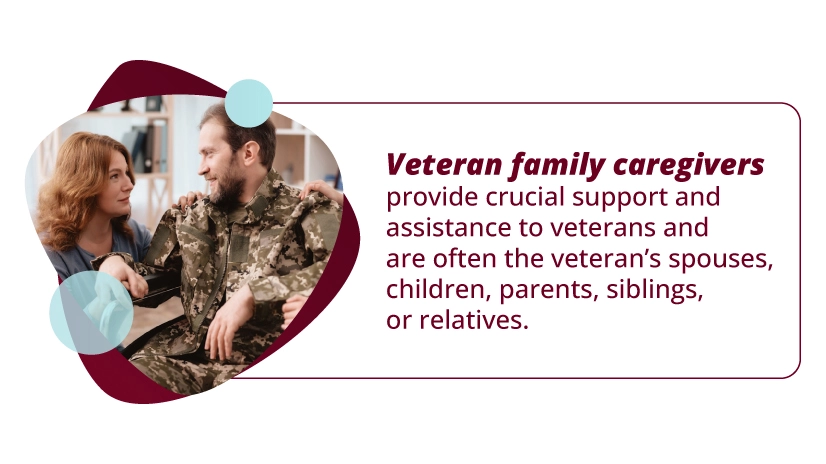
Substance Abuse In The Air Force
Explore the different aspects of substance abuse in the Air Force in this guide from Indiana Center for Recovery.

Veterans often require assistance due to physical injuries, mental health challenges, or aging-related issues. Family caregivers provide essential support, from helping with daily tasks to offering emotional and psychological support.
The challenges faced by a primary family caregiver are multifaceted. Despite these challenges, family caregivers are dedicated to their role, driven by a deep love and active duty. The article explores the key role played by family caregivers in supporting United States veterans.
Family caregivers provide crucial support, from helping with daily tasks to offering emotional and psychological support. Here’s what this article covers:
For veterans seeking support and guidance, contact Indiana Center For Recovery at (844) 650-0064 for comprehensive care and rehabilitation information.

Veteran family caregivers provide crucial support and assistance to veterans who have served in the military, especially when it comes to addiction challenges and mental health services. These eligible caregivers can be the veteran’s spouses, children, parents, siblings, or relatives.
The role of a primary caregiver encompasses a wide range of responsibilities. They offer emotional support, help manage medical appointments, and ensure veterans stick to their treatment plans. Their presence can make a substantial difference in a veteran’s ability to recover and maintain mental health.
Family caregivers also advocate for veterans, ensuring they receive the care and services they need from the healthcare system and other support networks. Without their tireless efforts, many veterans would struggle to navigate the challenges of the activity of daily living.
Veteran family caregivers often encounter different challenges as they home care for their loved ones struggling with addiction and health issues. Here, we explore some major challenges:
Family caregivers of veterans frequently encounter emotional and mental health difficulties. Watching a loved one struggle with physical injuries or mental illnesses like post-traumatic stress disorder (PTSD) can be deeply distressing. Caregivers often experience anxiety, depression, and feelings of isolation.
Financial strain is another major issue for veteran family caregivers. Many caregivers may need to reduce their work hours or leave their jobs entirely to provide full-time care. This loss of income, combined with the additional costs of addiction treatment and therapy, can lead to financial difficulties.
The physical demands of caregiving can put pressure on a caregiver’s health. Managing the daily needs of a veteran with addiction and mental disorders can lead to chronic fatigue, stress, and other health problems. Caregivers often neglect their health needs and do not get enough rest or exercise.
Many veteran family caregivers struggle with a lack of adequate support resources. Often, limited programs and clinical services are available to help them manage their caregiving responsibilities. It includes a shortage of respite care and insufficient access to mental health services to handle addiction-related challenges.
Understanding the challenges caregivers face is vital in providing peer support to help them effectively care for their loved ones struggling with addiction.
Caring for a veteran can be challenging yet rewarding for family members. Various financial support systems are available to help these dedicated caregivers.
The U.S. Department of Veterans Affairs (VA) offers a range of programs specifically designed to support veteran family caregivers. These programs include the VA Caregiver Support Program, which provides skills training and counseling to help caregivers manage their responsibilities.
Additionally, financial benefits are available, such as the Program of Comprehensive Assistance for Family Caregivers (PCAFC), which offers a monthly stipend to caregivers who fulfill eligibility requirements.
The Wounded Warrior Project is a well-known non-profit organization that provides additional support to veterans and military families. For caregivers, it offers programs such as the Wounded Warrior Project’s Independence Program, which helps injured veterans. Further, the Caregiver Action Network provides detailed information, educational resources, and support services to help caregivers manage their roles.
Various grants and financial aid programs are available to support caregivers. The VA offers financial benefits through the PCAFC, providing a financial stipend to caregivers of eligible veterans. Non-profit organizations and charities often have grant programs that can help cover costs related to caregiving.
By utilizing these resources, caregivers can better manage their responsibilities and ensure the well-being of their veteran service members.
Caring for a loved one can be both satisfying and challenging. Here are some strategies to help manage caregiving duties effectively:
Time management is important for caregivers. A daily schedule helps prioritize tasks and ensures that important activities are not overlooked. A planner or digital calendar can help track appointments, medication schedules, and other commitments.
Caregiving can be stressful, so it’s important to have strategies to cope with stress. Engaging in regular exercise and practicing relaxation methods like deep breathing, meditation, or yoga can also be beneficial. Finding time for events that bring joy and relaxation is equally important.
Technology can greatly aid in caregiving. Various apps help manage medications, track health metrics, and keep medical records organized. Video calling platforms enable caregivers to stay in touch with healthcare providers and get advice without leaving home.
A strong support network is vital for caregivers. Joining a support group in person or online provides a space to share experiences and advice. A local Caregiver Support Coordinator can connect you with family, friends, neighbors, and community resources that offer practical assistance and emotional support.
By adopting these strategies, family caregivers of eligible veterans can effectively manage their responsibilities while preserving their health.
Caregivers must care for themselves to maintain their well-being and provide the best care possible. Here’s a guide on the importance of self-care practices:
Self-care is vital for veteran family caregivers. When you take care of your physical, emotional, and mental health, you’re better equipped to handle the stresses and challenges of caregiving. Ignoring your needs can lead to burnout, health issues, and decreased ability to care for your loved one.
Implementing self-care doesn’t have to be complicated. Start with small, manageable steps:
Remember, even a few minutes each day dedicated to self-care can make a noteworthy difference in your overall physical health.
Joining family support groups and seeking mental health counseling can provide much-needed emotional support and practical advice. Support groups connect you with others in similar conditions, offering a sense of community and understanding. You can share experiences, learn from others, and find comfort in knowing you’re not alone.
Implementing practical self-care tips and seeking support through groups and counseling can make this journey to caregiving more manageable.
Veteran family caregivers have access to various services to support their needs. Firstly, the U.S. Department of Veterans Affairs (VA) offers programs such as Comprehensive Assistance for Family Caregivers (PCAFC), providing financial assistance, training, and respite care.
Additionally, a local VA medical center often provides support groups and counseling services tailored to caregivers’ needs. Non-profit organizations offer resources and community-building opportunities for caregivers. Furthermore, state and local governments may offer additional financial support programs, including counseling services.
In the United States, the Veteran Family Caregiver Program, initiated by the Department of Veterans Affairs (VA), offers support to caregivers of post-9/11 veterans. For qualifying, caregivers must be designated by the veteran as their primary caregiver, providing personal care services.
They must also undergo a comprehensive VA application process, background checks, and training. Additionally, the veteran must have a serious injury or a traumatic brain injury in the line of duty post-9/11. The program provides financial assistance, access to healthcare coverage, caregiver training, respite care, and mental health services to support the caregiver and the veteran.
Veterans who are grappling with psychological trauma and addiction find hope and healing at Indiana Center For Recovery.
We offer comprehensive programs, including detox, residential, outpatient, and family therapy, alongside specialized support for veterans. Our dedicated veterans program provides tailored therapy and support, addressing the exceptional challenges faced by those who have served.
Cognitive behavioral therapy (CBT) empowers individuals to recognize and change harmful thought patterns, fostering lasting recovery.
Seek relief with our flexible recovery options. Contact us at (844) 650-0064 to initiate your journey toward sobriety.